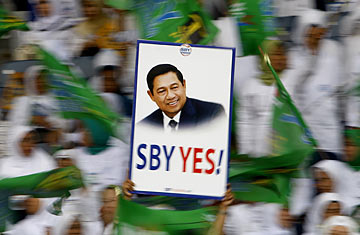
Supporters wave a campaign poster of Indonesian President Susilo Bambang Yudhoyono who is seeking reelection this year during his last campaign rally at Gelora Bung Karno stadium in Jakarta, Indonesia, Saturday, July 4, 2009. Indonesia will hold its presidential election on July 8.
Incumbent Susilo Bambang Yudhoyono cruised to a commanding victory in the nation's presidential elections yesterday. His single-round slam dunk over his opponents paves the way for Indonesia to take a greater role on the world stage, though analysts also warn the retired general not to let up on several important fights at home. Corruption fighters in Indonesia have repeatedly voiced concern that the Corruption Eradication Commission, or KPK, arguably the most feared agency in the country, was being weakened by forces in and outside the government. "We want to see the President stand up for the KPK," states Anies Baswedan, a political scientist and rector of Paramadina University in Jakarta. "He has to make sure its members are protected, otherwise all of the good members will leave."
Fighting corruption has been a top priority of the current administration, with defenders of SBY, as the President is known, quick to point out that even an in-law of the president was jailed for corruption. Still, legislation that could weaken the Corruption Court, where the KPK's cases are tried, is weaving its way through the Parliament, raising doubts about how long the current battle against corruption on multiple levels can be sustained. President Yudhoyono maintains that the fight will continue into his next five years but some fear he may lack the necessary tools to be effective.
Others regard the overwhelming mandate given to President Yudhoyono in his second and final term as head of state as a means of allowing him to focus more on policy than politics. His vice presidential pick of Boediono, a former central banker with no political affiliations, was another sign of how he resisted political pressures from coalition partners and chose a running mate known as capable and clean. "When he chose Boediono, that was the moment of truth," offers Wimar Witoelar, a former presidential spokesman. "I hope he has the courage not to be pressured by politicians. If it works he will have conquered his fear of politics."
Having demonstrated his skills at conquering the electorate at home, SBY is expected to use his second term to project the country's power overseas as a country where Islam, democracy and modernity can peacefully, and successfully, co-exist. "We have the capital to be a moderate Muslim nation and now we also have the government," says Wimar. This, he emphasizes, is because his re-election was fully democratic in an exercise that international observers didn't even feel the need to monitor, as they did in 2004. "This shows that Indonesia is moving to a place where it doesn't need them," says Paul Rowland, regional representative of the National Democratic Institute in Jakarta.
Indonesia has been increasing its international presence by sending troops to Gaza, through participating more in the United Nations, more recently, a new friend in the White House, with President Barack Obama having famously spent part of his childhood in Indonesia. The country is no longer viewed as a "messy state," as columnist Tom Friedman once described it, nor is Balkanization a real fear as regional conflict and terrorism have both been brought under control. "The second term is when [SBY] will build his legacy," predicts Baswedan. "He will emerge as a global leader."
Still, that legacy could come undone if the pressing domestic problems of infrastructure, poverty, bureaucratic reform and corruption are not dealt with promptly. While most agree the latest elections further solidify democratization, others warn that the country's authoritarian past cannot be forgotten. "We are going back to a one-man show," says Nico Harjanto, a political researcher at the Centre for Strategic and International Studies in Jakarta. "This is more dynasty politics." Given that one of SBY's sons, at 28, was the largest vote-getter in the Parliamentary elections without ever having given an interview that might be a sign of things to come.
For now, however, the country can take pride in the fact that its democracy is coming of age during a time of significant geopolitical turmoil, particularly in the Islamic world. "The election wasn't that exciting," says one Indonesian businessman. "But they were peaceful and legitimate. What more could you ask for?" Indeed, with the President winning in all but three provinces, it looks like most of the country is ready to follow him in a bold, new direction.
